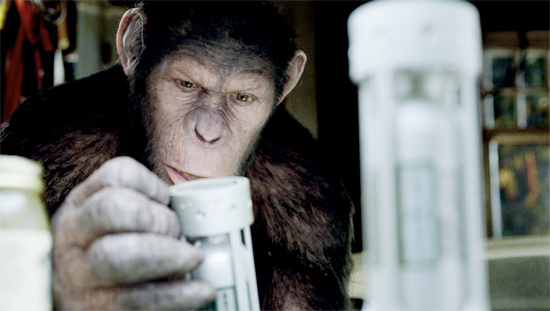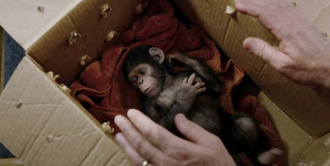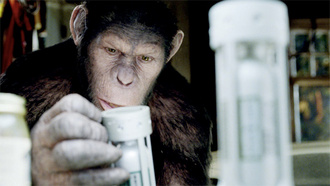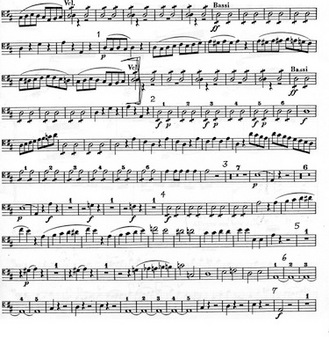The U.K. trailer for Rise of the Planet of the Apes has just been released, and when we looked at the British and American versions side by side, we were struck by the differences between the two. The U.K. trailer looks like something we’d want to watch. The U.S. one … not so much.

To paraphrase Ellen Ripley: Did IQs drop sharply across the Atlantic?
We have six reasons to believe that the U.K. edit of the Rise of the Planet of the Apestrailer is more engaging than the U.S. one. In brief, the U.K. trailer assumes we can think, while the U.S. version assumes we can only feel.
English Is Evil

Hollywood loves to hire an English actor—or an American with good mimicry skills—to play a villain. We’re sick of it. Having an evil Englishman as the antagonist is pure stereotype and completely devoid of imagination. And sci-fi is supposed to be the genre of imagination.
Oh, and it’s not an Irish, Welsh or Scottish accent, either. Just English.
We can spot the villain in the U.S. trailer fairly quickly when he says (in an English accent), “I want you to start testing on chimps ASAP” and “That chimp’s company property.” Because there’s nothing an American hates more than a pimp slap to our liberty.
Of course, in the U.K. version, the obvious villain is a American college boy who’s cruel to animals. But at least it’s not cliché.
Science!
One of the first things you hear in the U.K. version is our protagonist Will Rodman (James Franco) saying, “Meet Chimp 9. We gave him a gene therapy that allows the brain to create its own cells in order to repair itself. We call it the cure to Alzheimer’s.”
It’s a simple yet technical explanation of how Caesar the Chimpanzee becomes Caesar the Destroyer of Humanity … ya know, the plot. But the American version tells it differently:
“We’re talking about huge potential for millions of people. Our therapy enables the brain to repair itself. We call it … the cure.”
We can actually hear the thought process of the editors of the U.S. trailer: The simple explanation above? Nope, too complicated. Gene therapy? Too egghead. The word “Alzheimer’s”? Too much of a bummer. Huge potential for millions of people? Accurate and content-free! Let’s run with it!
Polite reminder to Hollywood: “Science” is part of the phrase “science fiction.”
Character

In the U.S. trailer, Caesar is treated like a plot device. He doesn’t have an emotional journey, and his actions are about as one-dimensional as they come. We even see this when he’s is first revealed to the audience. In the U.S. version, Will’s father is reaching for him, but doesn’t quite touch him. In the U.K. version, he holds into the father’s fingers, much as an infant would.
The fact that he’s interacting in the U.K. version makes him more a character and less of a prop.
Intellect Is Emotionless and Evil

Back to the U.S. trailer. Here, Caesar’s emotions are limited. He displays a bit of fear when locked into a cage, but the fear is replaced by cunning, which is rapidly replaced by pure simian evil. The only thing Caesar feels … is hate.
The message in the U.S. version is clear: See what you did there, science? You turned this simple creature into Satan’s Hairy Jester by making it smart! That’ll teach you to mess with book learnin’!
In the U.K. version, we see Caesar as a baby chimp, learning alongside Will, his human buddy. When Will’s confused father has trouble eating (clearly he provides the motivation for Will to cure Alzheimer’s), he compassionately aids him; when Will’s father has trouble with a neighbor, Caesar leaps to his rescue.
But then Caesar is captured and treated, well, inhumanely. The message is clear: Intelligence doesn’t cause evil. Sadism and degradation do.
Violence

What do we get in the U.S. version? The usual testosterone-laden action sequences. They include a prison breakout. The phrase “Put those apes down!” An ape hurling a sledgehammer at a police car. Machine guns. And vast amounts of property damage.
And as it happens, the U.K. version has a lot of the same action. However, in the U.K. version, we also get to see Caesar in quiet, thoughtful moments, where he’s learning and even contemplating a flower.
The U.K. version even has one more scene involving violence that the U.S. version ignored. At one point, Caesar attacks someone, but he only does so in defense of his friend—and after the episode, he looks regretful.
The Soundtrack

The U.S. music only hits emotional notes, from warning whistles to pulse-pounding drumbeats, and auditory clues tell us “Danger.” The second half of the trailer is nothing but percussion and its innate call to arms.
The U.K. music hits emotional notes too, but it’s not nearly as leading. The audience can make their own decisions about how to feel and when to feel it, based on the on-screen action. U.K. audiences are less likely to be led by the hand.
Best of all, in the second half of the trailer, where most of the violent action is, we get a lot of soprano vocals. The ape revolt isn’t menacing … it’s uplifting.

